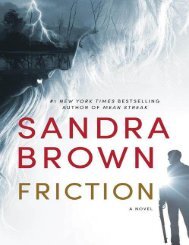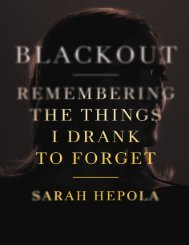Blackout_ Remembering the Things I Drank to Forget
Create successful ePaper yourself
Turn your PDF publications into a flip-book with our unique Google optimized e-Paper software.
steps, not talking.<br />
As much as my fa<strong>the</strong>r was <strong>the</strong>re during my childhood, he was also not <strong>the</strong>re. He had an<br />
introversion common <strong>to</strong> Finns, and <strong>to</strong> engineers. He avoided eye contact. If he was growing up <strong>to</strong>day,<br />
I’m curious what a psychiatrist would make of him. He had a boyhood habit of stimming, rocking<br />
back and forth <strong>to</strong> soo<strong>the</strong> himself. In his 20s, he had a compulsive blinking tic. In his middle age, he<br />
kept a notebook listing every winning Dallas lot<strong>to</strong> number, recorded in his careful, geometrically<br />
precise block lettering. A futile attempt at charting randomness.<br />
Perhaps <strong>the</strong>se were coping mechanisms of a childhood harsher than mine. His fa<strong>the</strong>r was sent <strong>to</strong> a<br />
mental institution when my dad was 15—a breakdown brought on by mental illness, drinking, or both.<br />
But most of my dad’s past, like my dad himself, was a mystery <strong>to</strong> me. All I knew was that my fa<strong>the</strong>r<br />
was not like those loud, wisecracking fa<strong>the</strong>rs on sitcoms who <strong>to</strong>usled your hair and tickled you till<br />
you snorted. He communicated in his own rhythms. If I said, “I love you, Daddy,” he would<br />
sometimes pat my head and say, “OK. Thanks.” So I learned that fa<strong>the</strong>rs were very loyal and<br />
dependable people who existed behind glass.<br />
My mo<strong>the</strong>r was full of passion and conversation. I sometimes marveled <strong>the</strong>se two people ever<br />
came <strong>to</strong>ge<strong>the</strong>r, but I was charmed by tales of <strong>the</strong>ir courtship. In lieu of an engagement ring, my fa<strong>the</strong>r<br />
gave her money <strong>to</strong> study in Germany, an act of gentle nonconformity and global discovery that shaped<br />
my worldview. But at night, in our cramped house, <strong>the</strong>ir fights curled like smoke underneath <strong>the</strong>ir<br />
bedroom door. And as tender as my mo<strong>the</strong>r could be, an Irish fire lurked in her, <strong>to</strong>o. I could hear her<br />
voice each night, bitten by frustration. The <strong>to</strong>ne that always made <strong>the</strong> veins on <strong>the</strong> side of her neck<br />
stand up like cords. Why can’t you do this right, John? Why can’t you listen, John?<br />
For a while, my bro<strong>the</strong>r and I were allies on this battleground. Josh was my hero, a swashbuckling<br />
little boy who could find excitement in any dusty corner. He turned blankets in<strong>to</strong> royal capes and<br />
wicker chairs in<strong>to</strong> spaceships from a galaxy far, far away. He was four and a half years older than<br />
me, with a precocious mind forever solving <strong>the</strong> Rubik’s Cube of how <strong>the</strong> world worked. Of course,<br />
he solved his actual Rubik’s Cube. I gave up, and changed <strong>the</strong> stickers.<br />
I didn’t realize it, but Josh had a rough entry <strong>to</strong> school, <strong>to</strong>o. A Yankee boy dropped in<strong>to</strong> a part of<br />
<strong>the</strong> world where kids were still fighting <strong>the</strong> Civil War. The brainiac skills that wowed his younger<br />
sister were useless on <strong>the</strong> football field, where Texas boys proved <strong>the</strong>ir mettle. And by <strong>the</strong> time he<br />
entered middle school, our shared excursions had turned in<strong>to</strong> his solo journeys: on<strong>to</strong> <strong>the</strong> clunky<br />
personal computer he won in a radio contest, in<strong>to</strong> <strong>the</strong> J. R. R. Tolkien books crinkled and dog-eared<br />
with devotion. I wanted <strong>to</strong> follow him in<strong>to</strong> those exotic boylands, but he started closing doors in my<br />
face. Get out. Go away.<br />
I got my own room. Pink walls, red carpet, a Strawberry Shortcake explosion. And in this private<br />
universe, where no one could criticize me, I was <strong>the</strong> star of every show. My fantasy worlds were<br />
dominated by girls like me, discovering <strong>the</strong>ir own power. I was Sandy, in <strong>the</strong> last scene of Grease,<br />
strutting in hot pants and causing a bulge in every man’s heart. I was plucky Orphan Annie, rescued by<br />
a billionaire she saved right back. I was Coco, fan-kicking her way through <strong>the</strong> cafeteria in Fame.<br />
Fame. I wanted it more than anything. If you were famous, nothing hurt. If you were famous,<br />
everyone loved you. In fifth grade, I would start plastering my walls with teen pinups—Prince<br />
Charming in <strong>the</strong> form of a soft boy with a popped collar—and I became fixated on celebrity and<br />
glamour, those twin instruments of escape.<br />
But before that, <strong>the</strong>re was <strong>the</strong> beer.





